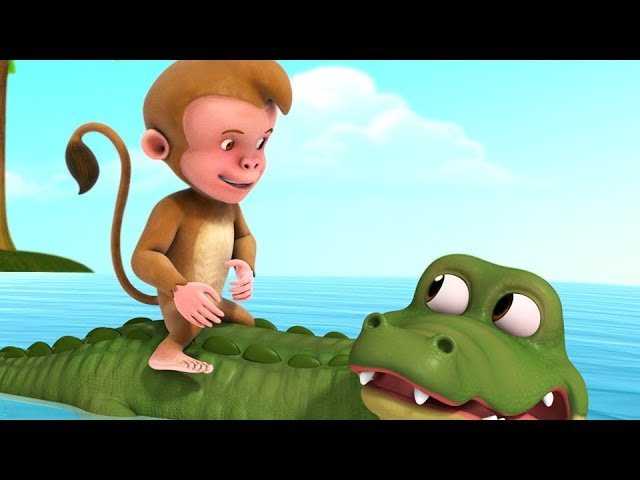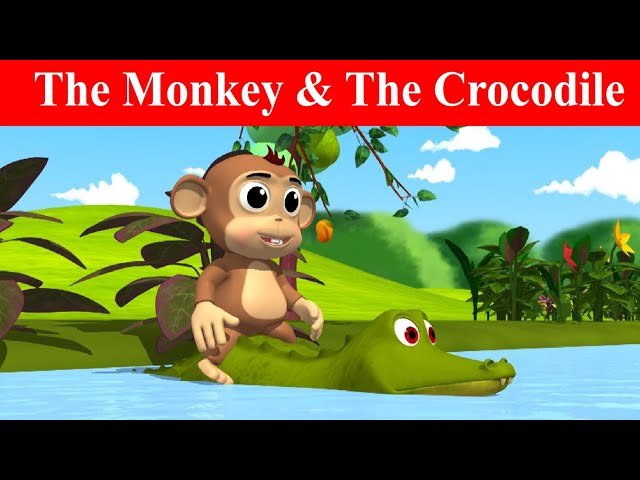The ancient fable of The Monkey and the Crocodile, originating from the Panchatantra—a collection of Indian moral stories dating back to 300 BCE—offers far more than a simple lesson about wit defeating strength. At its core, the story follows a clever monkey who outsmarts a crocodile bent on devouring him, but its layers reveal profound insights into trust, deception, and the power of quick thinking. The tale begins with an unlikely friendship: a monkey living in a rose apple tree shares fruit daily with a crocodile, who carries some back to his wife.
The crocodile’s wife, however, grows jealous and demands the monkey’s heart, believing it to be as sweet as the fruits he eats. The crocodile, torn between loyalty and his wife’s wish, lures the monkey onto his back under false pretenses. Midway across the river, he reveals his deadly plan, only for the monkey to claim he left his heart in the tree—a lie that saves his life when the gullible crocodile returns him to shore.
What many retellings omit is the story’s deeper cultural context. The Panchatantra was designed as a niti-shastra (treatise on political wisdom) for princes, teaching diplomacy and strategy through animal allegories. The monkey represents the ideal advisor—resourceful and calm under pressure—while the crocodile embodies brute force without foresight.
The tale’s river setting is symbolic, representing the flow of life’s challenges, and the rose apple tree (jambu in Sanskrit) holds sacred significance in Indian lore, often linked to wisdom and immortality. Jain and Buddhist versions of the story reframe it as a lesson in karma, where the crocodile’s deceit returns to harm him. Even the monkey’s lie carries nuance—rather than condemned as immoral, his quick thinking is celebrated as necessary survival in an unjust world.

The characters are masterfully crafted archetypes. The monkey (kapila in some versions) isn’t just clever but socially intelligent, building rapport with the crocodile to ensure a steady food supply—until trust is betrayed. His ability to “think on his feet” mirrors what psychologists now call adaptive intelligence—solving novel problems in real time. The crocodile (nakra) symbolizes blind obedience to emotion (his wife’s envy) over reason. His failure to question the monkey’s absurd claim about leaving his heart in a tree highlights the dangers of literal-mindedness. Even the offstage wife plays a pivotal role, embodying how unchecked desires can corrupt relationships.
Historically, this fable traveled far beyond India. Persian scholar Ibn al-Muqaffa adapted it into Kalila wa Dimna, where it became a metaphor for courtly intrigue. Southeast Asian versions replace the crocodile with a turtle, while African oral traditions feature a hare and hippopotamus. The story’s spread along trade routes underscores its universal appeal—whether in royal courts or village gatherings, its themes of wit overcoming oppression resonated deeply. Modern psychologists note how the monkey’s tactics align with problem-focused coping, turning a threat into a solvable challenge.
The fable’s relevance today is striking. Entrepreneurs cite it to describe outmaneuvering larger competitors, while educators use it to teach critical thinking. Neuroscientists might praise the monkey’s divergent thinking—his ability to fabricate a plausible lie under duress. The story even offers an ethical dilemma: is the monkey’s deception justified? This ambiguity makes it richer than Western fables with clear-cut morals.
From its sacred roots to its global legacy, The Monkey and the Crocodile endures because it celebrates intelligence as the ultimate survival tool. In a world where power imbalances persist, its message remains vital: quick thinking and adaptability can level any playing field. Whether as a children’s bedtime story or a strategic parable for adults, this ancient tale reminds us that brains, not brawn, often win the day.
Go to main page


